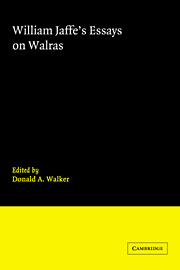Book contents
- Frontmatter
- Contents
- Preface
- Acknowledgments
- Introduction
- PART I WALRAS'S BIOGRAPHY
- 1 Unpublished papers and letters of Léon Walras (1935)
- 2 Léon Walras, an economic adviser manqué (1975)
- PART II THE GENESIS AND DEVELOPMENT OF WALRAS'S IDEAS
- PART III THE SCOPE OF WALRAS'S WORK
- PART IV SPECIAL TOPICS IN WALRAS'S ECONOMICS
- PART V WALRAS'S PLACE IN THE HISTORY OF ECONOMIC THOUGHT
- Index
2 - Léon Walras, an economic adviser manqué (1975)
Published online by Cambridge University Press: 05 May 2010
- Frontmatter
- Contents
- Preface
- Acknowledgments
- Introduction
- PART I WALRAS'S BIOGRAPHY
- 1 Unpublished papers and letters of Léon Walras (1935)
- 2 Léon Walras, an economic adviser manqué (1975)
- PART II THE GENESIS AND DEVELOPMENT OF WALRAS'S IDEAS
- PART III THE SCOPE OF WALRAS'S WORK
- PART IV SPECIAL TOPICS IN WALRAS'S ECONOMICS
- PART V WALRAS'S PLACE IN THE HISTORY OF ECONOMIC THOUGHT
- Index
Summary
There were several episodes in Léon Walras's life in which he appeared as an economic adviser to governments, sometimes at the behest of public authorities, but for the most part uninvited. There is, however, no case on record where he had any success or was taken seriously. Walras's ineptitude in his approach to officialdom, which manifested itself in his very first attempt to influence public policy, illustrates the difficulty that was to thwart his later attempts and, not surprisingly, doomed them all to failure. It is with this first attempt that I propose to concern myself in this paper, not only because of its interest as an anecdote, but also because of the light it sheds on Walras's social philosophy and his sense of reality.
Early in 1860, when Léon Walras was a struggling young journalist in Paris and had not yet found himself as the economic theorist he was destined to become, the Council of State of the Vaud Canton in Switzerland announced a prize of 1,200 francs for the best essay on the question, “Within the present social order, what system of taxation would achieve the most equitable possible distribution of the burden on taxpayers or taxable commodities?” Confident in the economic and social philosophy he had imbibed from his father, Auguste Walras, who was an economist in his own right, Léon Walras answered the challenge.
- Type
- Chapter
- Information
- William Jaffe's Essays on Walras , pp. 36 - 52Publisher: Cambridge University PressPrint publication year: 1983



